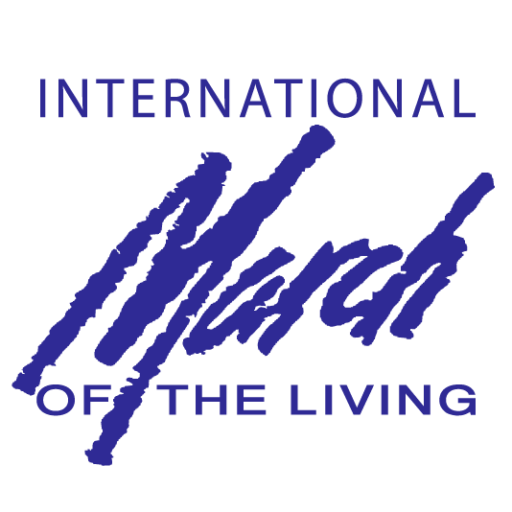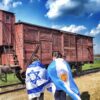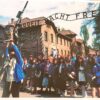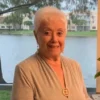-
Liberation Stories from Holocaust Survivors
On January 27, 1945, Soviet forces liberated the Auschwitz-Birkenau extermination camp, discovering the largest Nazi killing center in Europe. Auschwitz has become a symbol of the Holocaust, representing the depths of man’s inhumanity to man. Eighteen governments have legislated January 27 as an annual Holocaust Memorial Day. In November 2005, the United Nations passed a resolution to mark January 27 as an international day of commemoration to honor the victims of the Holocaust, and urged member states to develop educational programs to impart the memory of this tragedy to future generations. Holocaust Remembrance Day ceremonies will be organized on the international, national, regional and local levels, including in universities and schools.
Continue reading -
Survivor Story: Elly Gotz
Holocaust survivor, Elly Gotz tells his journey from liberation to March of the Living.
Continue reading -
Survivor Story: Nate Leipiciger
Holocaust Survivor, Nate Leipiciger, tells his liberation story.
Continue reading -
Survivor Story: Alexander Henrik Laks
Holocaust Survivor, Alexander Henrik Laks, tells his journey from liberation to March of the Living.
Continue reading -
Out of the Depths: The Story Of A Child Of Buchenwald Who Returned Home At Last
By Chief Rabbi Israel Meir Lau, with Forewords by Shimon Peres and Elie Weisel In his recent book, Rabbi Israel Meir Lau tells the miraculous story of his rescue from…
Continue reading -
Survivor Story: Heddi Bohm
Holocaust survivor, Heddi Bohm, delivers a powerful speech about her journey to liberation.
Continue reading -
Survivor Story: Nate Leipciger
Why I Continue to Return to Poland: The Uniqueness of the March of the Living The following are my personal observations and assessments of the March. I am sure that each Survivor, student, educator and chaperon has their own list of factors that influence and are responsible for the success of the March. These comments are based on my observations and assessment of various groups through the many Marches that I participated on with Jewish and Non-Jewish groups. I feel that the March is a unique and unequalled educational opportunity for our future leaders on whose shoulders the Jewish world of tomorrow rests. The question I most often encounter from other survivors is “Why do you continue to go on the March?”. Some Survivors feel uncomfortable returning to Poland for various reasons but many having reached the age of 80 or more, feel that the physical strain and emotional stress is more than they are prepared to endure. This reduces the number of survivors that are prepared to go, to a very small amount. Thus the task falls on the child survivors—the youngest group of survivors. The child survivors who were hidden by righteous gentiles also have the least hang ups about going back to Poland and Europe. I feel an obligation to go as long as my energies and my health will allow. I also feel a duty to tell the story of those who did not make it. I owe it to the six million, especially the children. Having arrived at Auschwitz at the age of 15, and having seen the others of my age group Marched off directly to the gas chamber, I feel a tremendous obligation to educate our youth. There are many other reasons which I will outline briefly, not necessarily in the order of importance. I encouraged our youth to go on the MOL and my grandchildren have responded to my urging. I have, kenien’hara, nine grandchildren. This year, the fourth of my grandchildren will be with me on the March. I hope to have the strength and health to accompany the others on future MOL trips. It is very difficult to describe the feelings of the Survivors when we see the expression on the faces of our young students listening to our stories and going through the various sites—be it death camps, abandoned synagogues, neglected cemeteries, reconstructed synagogues or sites of mass graves. The students are the raison d’être of the March. Their innocence, their intelligence, their dedication, their eagerness to learn, their search for information and knowledge, their readiness to experience the unknown “emotionally and cerebrally” are all individually and collectively paramount to the success of the March. The students energize and reinvigorate me and give me strength to go on and to educate our youth. These young people hang on to each word, trying to understand what it is that they are seeing, trying to make sense of what is really incomprehensible. They exhibit genuine feelings and empathy for the victims. In many cases the victims were their grandparents, great grandparents and other members of their unknown lost families. We tell our stories of suffering and survival, but equally important are the stories of our families and how we lived before the terrible times of the Shoah. We tell them of our pain of separation, our longing to be with our family only a few more moments, our disappointment in not expressing our love to them or not having said good-bye. Our educators are our greatest assets. Most have made the trip many times; they are knowledgeable speakers, facilitators and great teachers. They make the prewar and Shoah time come alive for the students. They have great feelings for and detailed knowledge of the European Jewish societies, their various factions and contributions that each made to the European society in general and the Jewish society in particular. They are familiar with the competing interests of the various factions, the conflicts and opposing views. The richness of the Jewish communities in pre-war Europe was legendary and unsurpassed at that time. Our spiritual leaders give our students a grounding and connection to our religious heritage. They connect us to our vast heritage that goes beyond the 1000 years that we lived in Europe and Poland. They are crucial to the mental health of our youth and together with our educators are responsible for ensuring that the students do not become traumatized. Collectively we impress on our students that the main purpose of our trip is to remember not only the way in which our people perished but equally important, to learn how they lived and what contributions they made to the world. It is especially important to learn of the contributions made to Jewish study, medicine, Yiddish, Hebrew and Polish literature, as well as science, music and social studies. These contributions were made in less than ideal circumstances, amid Anti-Semitism, with many obstacles in their way. Finally, each of my trips to Poland is a pilgrimage and homage to my mother, sister, grandparents and dozens of members of my family who were such an integral part of my early childhood. It is a time for recollection of sweet memories, of happy times spent with my immediate family and friends. As I get older each trip is more difficult and more taxing, nightmares are more frequent, horrible memories rekindled, and frustration and anger returns. The world went mad and our neighbors and the rest of the world stood callously by in silence while we suffered unimaginable cruelties and death. But I must go on hoping that tomorrow will be better, that soon the world will recognize that hatred leads to more unabated hatred and endless suffering. If there is a meaning to our survival, it is that even one small voice can make a difference in the long run. Nate Leipciger, Holocaust Survivor and March of the Living Chaperone, 2007.
Continue reading





